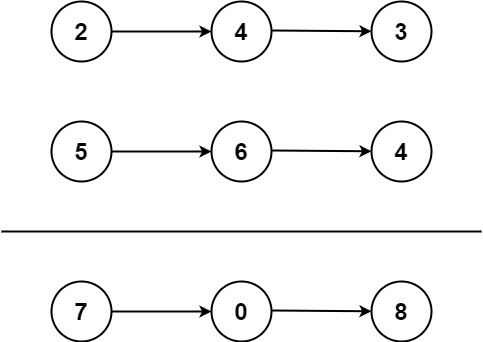LeetCode-in-All
2. Add Two Numbers
Medium
You are given two non-empty linked lists representing two non-negative integers. The digits are stored in reverse order, and each of their nodes contains a single digit. Add the two numbers and return the sum as a linked list.
You may assume the two numbers do not contain any leading zero, except the number 0 itself.
Example 1:

Input: l1 = [2,4,3], l2 = [5,6,4]
Output: [7,0,8]
Explanation: 342 + 465 = 807.
Example 2:
Input: l1 = [0], l2 = [0]
Output: [0]
Example 3:
Input: l1 = [9,9,9,9,9,9,9], l2 = [9,9,9,9]
Output: [8,9,9,9,0,0,0,1]
Constraints:
- The number of nodes in each linked list is in the range
[1, 100]. 0 <= Node.val <= 9- It is guaranteed that the list represents a number that does not have leading zeros.
Solution
# Definition for singly-linked list.
#
# defmodule ListNode do
# @type t :: %__MODULE__{
# val: integer,
# next: ListNode.t() | nil
# }
# defstruct val: 0, next: nil
# end
defmodule Solution do
@spec add_two_numbers(l1 :: ListNode.t | nil, l2 :: ListNode.t | nil) :: ListNode.t | nil
def add_two_numbers(l1, l2) do
add(l1, l2, 0)
end
defp add(nil, nil, 0), do: nil
defp add(l1, l2, carry) do
{val1, next1} = content(l1)
{val2, next2} = content(l2)
sum = val1 + val2 + carry
%ListNode{val: rem(sum, 10), next: add(next1, next2, div(sum, 10))}
end
defp content(nil), do: {0, nil}
defp content(node), do: {node.val, node.next}
end

